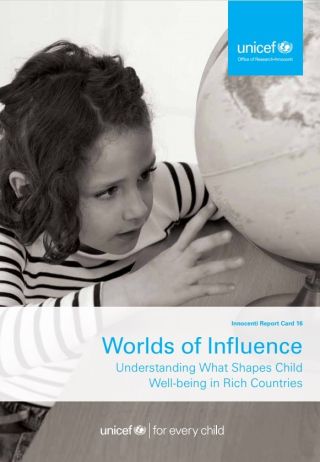Child wellbeing at risk in rich countries - New Study

The latest in the UNICEF Innocenti Report Card Series, Worlds of Influence: Understanding What Shapes Child Well-being in Rich Countries, warns that the world's richest nations must protect child wellbeing in the post-Covid 19 fallout. The Report, based on 41 OECD and EU countries, looks at a broad range of areas affecting child wellbeing, from chances of survival, growth and protection; to whether they are learning and feel listened to; to whether their parents have the necessary resources to adequately support their children.
The Report considers wellbeing across three domains - mental health; physical health; and academic and social skills. The results in respect of mental health are concerning. In 12 of the 41 countries, less than 75 per cent of children aged 15 have high life satisfaction, and while there are no comparable data on mental health across the 41 countries, suicide is one of the most common causes of death for children aged 15 to 19. Physical health indicators also give cause for concern. The findings of the Report indicate that 1 in 15 infants are born with low birth weight, identified as a key risk to survival. In one in 10 countries, more than a third of children are overweight or obese and the number of obese children aged 5 to 19 worldwide is expected to rise from 158 million to 250 million by 2030.
A lack of basic skills among children aged 15 was also evidenced in the Report. Two in five children on average do not acquire basic reading and mathematics skills by age 15, and in seven of the 41 countries, the number decreases to less than half. In terms of social skills, described in the Report as confidence in developing interpersonal relationships, most children agree that they make friends easily, but in 18 of the 41 countries, more than one in four children disagree with this statement.
In considering why children in rich countries may not have a good childhood, the Report identifies good relationships as important to child wellbeing, with those with supportive families having better mental wellbeing, while a lack of participation in decision-making in school or at home contributed to poor wellbeing. Bullying is also cited as a serious problem with long-lasting effects. Lack of parental supports may also be a factor, with at least 1 in 10 parents in some countries reporting no family or friends that they can count on for support in caring for their children. Other issues such as a lack of resources, gaps in family policy and the broader socio-economic context also reportedly influences child wellbeing.
The Report concludes with a series of recommendations across three broad themes: Consult Children; Connect Policies; and Create Strong Foundations. These recommendations should be at the heart of policies affecting children, including those impacting on their broader surroundings, such as family poverty and deprivation.
Child Wellbeing in Ireland
According to the Report, Ireland's overall ranking for child wellbeing outcomes is 12th. Our ranking for child mental health is poor, at 26th; our ranking for physical health is in the mid-range at 17th; and our ranking for academic and social skills is relatively high at 6th. This indicates that while a focus on education has yielded benefits, there is a sigifnicant detriment to our children's mental and physical health which must be addressed.
Child mental health is a particular issue in Ireland. The latest HSE Performance Management Report for May June 2020 shows 2,486 children on the waiting list for the Child and Adolescent Mental Health Service (CAMHS) in June 2020 (down from 2,612 in May), with 1,286 waiting more than three months for a first appointment (up from 1,270 in May) and 10 per cent (247 children) waiting more than 12 months. The rate of admission to CAMHS Inpatient Unit stood at 80.8 per cent in June, almost 15 percentage points below the target admissions of 95 per cent. The other almost 20 per cent of children admitted to adult acute care inpatient units, which is grossly inadequate. This Performance Management Report cites challenges presented by the level of vacancies and difficulties recruiting as hampering the CAMHS Waiting List Initiative to reduce waiting lists to below 12 months.
Adequate resourcing of CAMHS must be a key priority for Budget 2021.

GIVING A VOICE TO THOSE
WHO DON’T HAVE A VOICE
When you support Social Justice Ireland, you are tackling the causes of problems.
